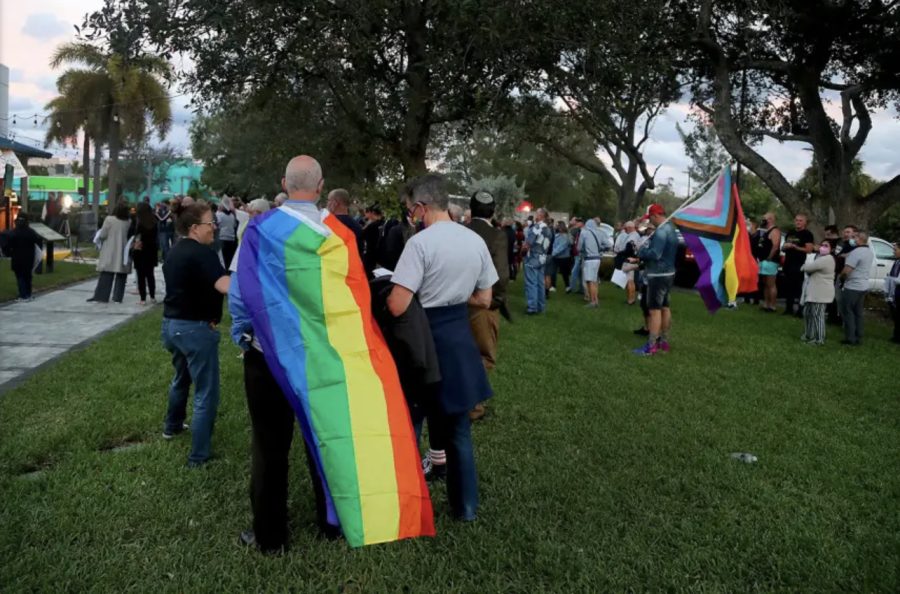“Don’t Say Gay” Bill Silences Students and Staff
Supporters gather in South Florida to push back against the “Don’t Say Gay” bill.
April 7, 2022
Recent concerns have arisen in Florida with a newly issued bill that has been sent to the Senate and House of Representatives, essentially banning students and staff members from discussing sexuality and gender identification in Florida public schools.
In essence, the State House Education and Employment Committee moved forward to the Judiciary branch with the Parental Right in Education the bill entitled, “Don’t Say Gay,” to ensure legislation will block LGBTQIA+ curriculum from being taught in schools.
“In hope, this bill will reinforce the fundamental right of parents to make decisions regarding the upbringing and control of their children. The bill may not encourage classroom discussion about orientation or gender identity in primary grade levels or in a manner that isn’t age-appropriate or developmentally appropriate for the students,” Republican and sponsor of the legislation, Joe Harding.
School districts supporting the potential bill have mentioned that students shouldn’t “worry about picking your gender at a young age,” while preventing same-sex parents from participating in classroom activities and oppressing Gender Sexuality Alliance (GSA) clubs.
“Schools need to be teaching kids to read and write. They need to teach students science and history. We need more civics, an understanding of the United States Constitution, and what makes our country unique. All those basic things,” Florida Governor, Ron DeSantis.
Although concerned parents have been encouraged to sue, any parental or staff member violation of the bill, such as suing or seeking damages, will result in fees and court costs.
However, LGBTQIA+ advocacy groups, such as The Gay, Lesbian, and Straight Education Network (GLSEN), have started fighting the bill throughout Florida communities. GLSEN has concluded that 70% of LGBTQIA+ students have been harassed at school for their orientation. In comparison, the Trevor Project Study completed an analysis that 42% of LGBTQIA+ students have considered physical harm and suicide due to anti-LGBT sentiments.
Melanie Willingham-Jaggers, GLSEN executive director, emphasized, “This [the bill] would erase LGBTQ+ history and culture from lesson plans and sends a chilling message to those students’ families since it could imply shame.”
If signed into law, the bill could act as a complete ban on the lessons on LGBTQ+ history, oppression, and discussions about identities and orientation. Laws like this directly attack children for who they are, preventing them from learning and making healthy decisions.
“We have to create a learning environment where students feel safe and healthy. Otherwise, it’s not an effective learning environment,” Heather Wilkies of Zebra Coalition, a major Florida LGBTQ+ advocacy group.
School districts began inclusive of LGBTQIA+ curriculums as the Recall Education for Healthy Youth Act granted comprehensive sex education programs to cover sensitive and respectful discussions. As a result of not including same-sex learning material, the Trevor Project has concluded students report a lower overall GPA, skip class because of an unsafe environment, sexually transmitted diseases are more common, and self-harm is unfortunately frequent.
“Queer issues and access to supportive resources have been the priority against anti-LGBTQ attacks in recent years and have been a heightened effort since more violence has occurred. It’s so disheartening to think that students wouldn’t be able to freely talk about themselves or learn anything about their history,” further mentions Wilkie.
If passed in Florida and other anti-LGBTQIA+ states, including Arkansas, Kentucky, Indiana, South Dakota, New Hampshire, and Oklahoma that have begun developing a similar bill, students and staff members are put at a greater risk of feeling silenced, bullied, and harming themselves. In an everyday, developing country, this is a chance for America to make a landmark and step forward to encourage all students to view each other as equals, not further oppression.





